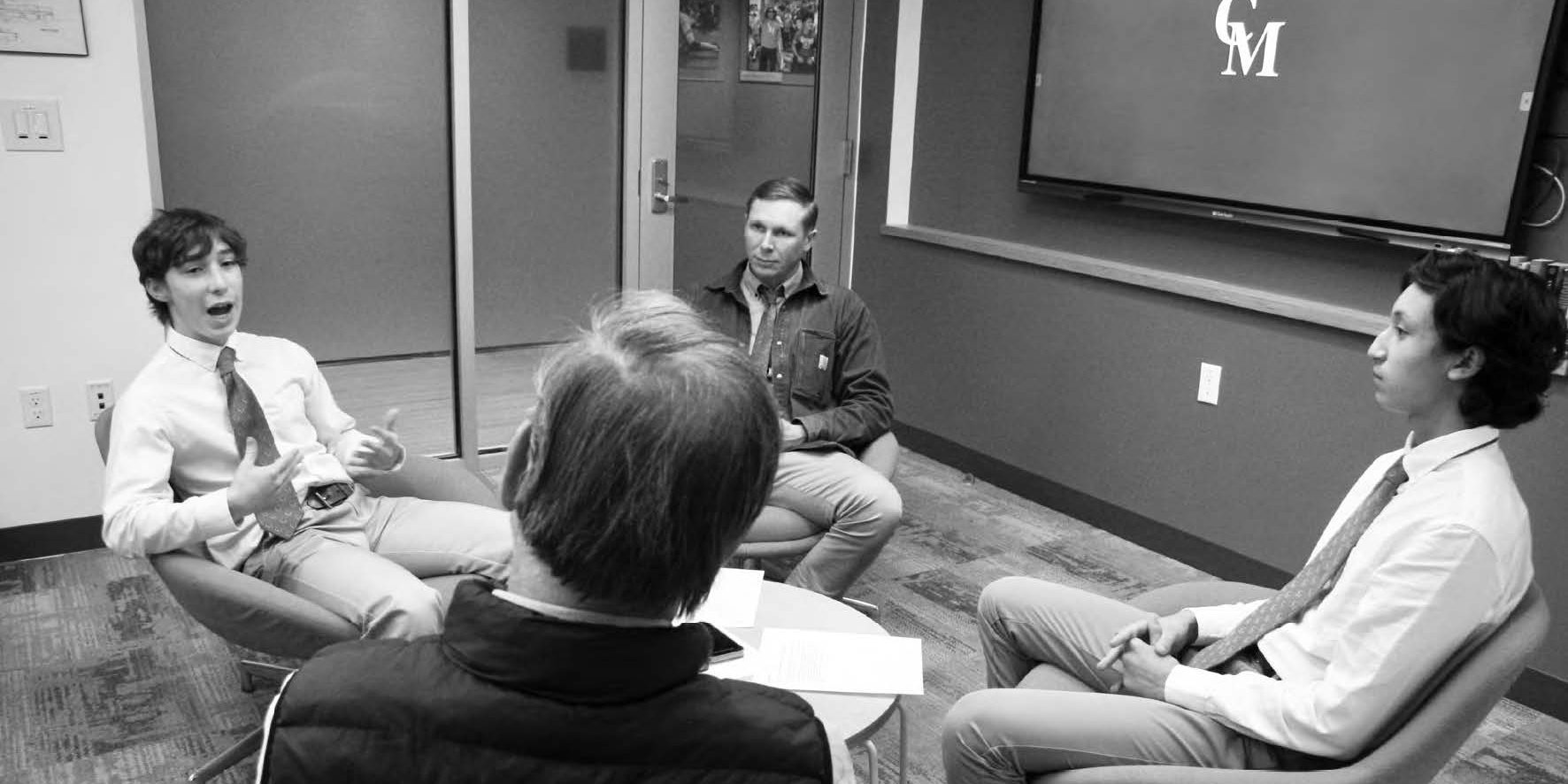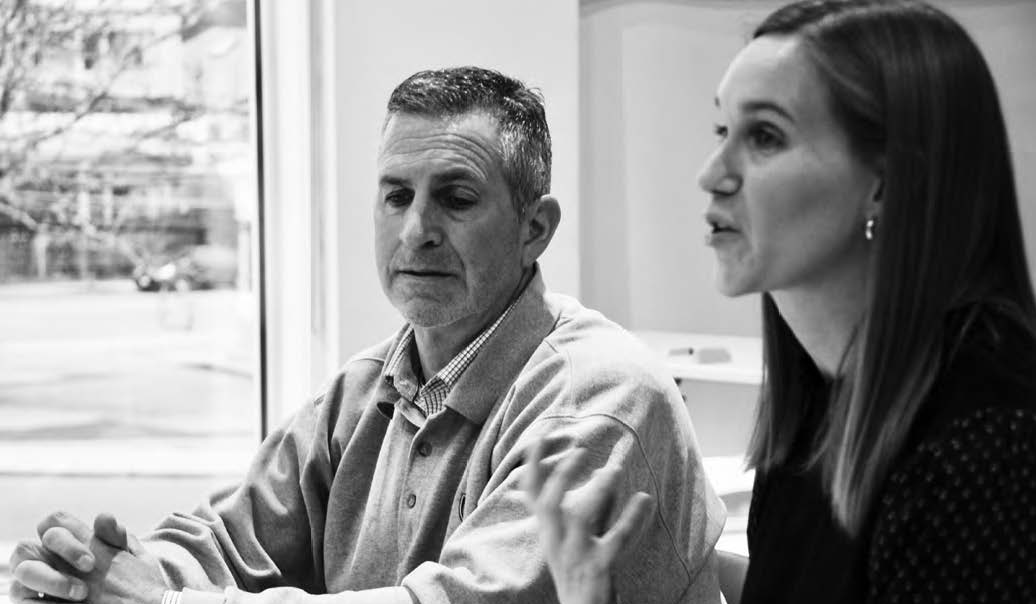Q.E.D. - Are Pluralism, Civil Discourse and Tolerance the Keys to a Healthy Society?
Free speech is both a right and a buzzword. Its presence is a demonstration of our society’s commitment to pluralism and tolerance, where both go hand-in-hand. Recently, however, free speech has been tested. Claims from many different groups say that it poses a threat to public and individual safety when used in disagreement or as a counterpoint. Having the ability to speak and think freely is a Constitutional right but it comes with the responsibility to exercise tolerance towards other points of view. And for a society that champions pluralism, the youth must be educated in both the country’s history and how government works. Continuing these ideals falls to teachers who are the issuers of this knowledge, and it is for this reason we asked CM high school history teachers Vincent Bradley, the department chair, Steven Goode P’25, and Tom Jordan ’90, along with middle school social studies teacher, Barbara Flynn to weigh in on the importance of their roles and how CM prepares its students to uphold the values of our Constitutional Republic.
The question is set. All the panel need do is demonstrate its truth, hence Quod Erat Demonstrandum.
Are pluralism, civil discourse and tolerance necessary conditions for a civil society?
Tom Jordan ’90: Yes. Just thinking about that word, pluralism; our society is made up of citizens who come from many different backgrounds, many different experiences and viewpoints. So, I think it’s important to be able to listen to as many viewpoints as we can. Fortunately, we have the guarantee of our First Amendment rights from our Constitution. That’s what makes us unique among the nations of the world… that we can have that discourse. Even though you may adamantly disagree with someone we have the beauty of our democracy, or republic, and can hold those different opinions. The challenge is finding a compromise.
Steven Goode P’25: I concur with you. And when we talk about pluralism, I just think of the first three words of our Constitution: “We the People.” And at the founding of our country, “We the People” didn’t include all the people. Over time, “We the People” has come to mean truly that. But it didn’t include guys who looked like me, or women. Today, however, it does. We’ve come a long way.
Barbara Flynn P'22: I’m fortunate to have the eighth graders for civics…in the early stages of their education. When you mentioned, “We the People,” they studied the Preamble and we talked about who “We the People” were at the beginning of our nation. I think as teachers, that’s what we strive for: to impress upon the boys that they can make a difference, and that they are a part of, “We the People.” Especially with eighth graders. They think, “well, it doesn’t count until I’m 18.” And I think we do a great job of that here in teaching them that they too, can be a problem solver, that they too, are really important to society, their voice matters, and their actions matter.

Vincent Bradley: I think our task as educators is to help students understand some of the challenges within our history and to help them seek the truth while not sanitizing it. I think CM is such a great place in terms of pluralism because it is a school that represents a hundred different zip codes. And those kids bring their perspectives to our classrooms, within the Brotherhood, within an atmosphere where they can discuss their agreements, their disagreements, and I think learn from each other. There aren’t a lot of schools like CM. It’s one of the challenges in our society today. Destiny has become a zip code. They determine access to education, resources, and opportunity. So, to have a student body coming from a hundred-plus zip codes is quite unique, and to do so within an environment that is diverse, from a socio-economic perspective, and from a racial and ethnic perspective, representing pretty much the Boston area is a special environment to teach history.
In your opinion is it more important now, that students are taught the functions of government, an understanding of the Constitution, how the Declaration of Independence shaped the path the country took and why? Are these civic fundamentals, during times of so much division, that much more important to teach?
Jordan: Teaching these documents is vitally important. A lot of people in our country have not read the Declaration of Independence. A lot of people have not read the Constitution, or they want to interpret the Constitution in their own way. So, I think we expose a lot of our high school students to those documents, and so that they have been schooled in those democratic manuscripts and understand how fragile this democracy really is.
Goode: I was on the Massachusetts History Board. I can remember when they extracted social studies and history from the MCAS test because they deemed them unnecessary. Doing this, set the alarms off in many of the social studies teachers because what they were saying was that history was no longer important and the only thing that’s important is STEM. And STEM is important. But maybe you should watch some cartoons. Because cartoons make fun of some of our society. Take the mad scientist. He invents machines that destroys the world. He doesn’t understand tolerance of other people. And, I think this is a downfall, here in Massachusetts, and across the country, where if you’re not deeming social studies important, you will see the rise of authoritarians who can take everything away. By not striking a balance between teaching STEM and technology-related subjects with civics and history are we jeopardizing the very enlightened entity that we live in because students know more about computers than the way our country is governed?
By not striking a balance between teaching STEM and technology-related subjects with civics and history are we jeopardizing the very enlightened entity that we live in because students know more about computers than the way our country is governed?
Bradley: I think it’s a real challenge. If you look at the number of history majors, they have declined as colleges become more of a financial proposition. And to Steve’s point, if you don’t test it, you don’t teach it. We’re fortunate that we have five years required of history. And I think the vast majority of students take a sixth year of history, with electives, which is great. We have the opportunity to offer a diverse range of electives that strike at these themes. But at the national level, when you understand most Americans take their last meaningful history course junior year in high school, that’s very challenging.
Jordan: I do worry about adults and young adults who do not have that foundation and so start to interpret history in ways that are detrimental to democracy. And so, we’ve seen that over the last several years where it becomes more political than finding out what the truth is. That’s a danger, right there.
Goode: I think you nailed it on the head with that. Here, we want to have this great nation, but we’re cutting ourselves off at the knees by not insisting on it as a required course. I think the beauty of CM, and this is why I sent my kid here, are the teachers, the staff, and the curriculum. I saw first-hand how it all comes together, and I saw pluralism, and I saw compassion, and I saw people who cared about what they were doing. And the kids, I just see it as there’s so many paths that they can go. But all of those paths lead to history. Again, if we don’t teach history, our country will beat itself. It’ll be like all great empires. The Romans, they beat themselves from the inside. And that’s why they fell down. Are we the next empire to go down?
Flynn: I think that’s a really important point. We know how great the Greeks were, how great the Romans were, but let’s take a look at how they fell, and they fell from within. In seeing the program work with both of my sons, if you were to ask them each and every year which was their favorite subject; nine times out of 10, it would be history. Because there’s this passion, here, this love of teaching this subject matter, and the urgency we have with our kids, and emphasizing that THIS IS REALLY IMPORTANT AND YOU GOT TO LEARN FROM THIS MISTAKE. I always quote George Santayana, “Those who do not learn from history are doomed to repeat it.” It’s written right there on my course sheet at the beginning of the year. It’s important.

Is that the purpose of history? To act as glue for society?
Goode: I would definitely say that history binds us all, because it’s our common denominator. Bradley: Glue is a good analogy. A good history program will create the commonality that we all share, the values upon which our civilization is based, and the responsibilities, which we all hold to keep that civilization progressing. But also, to take a critical look and not have it drift into mythology.
What would you say to a student who’s graduating, who you’ve taught in some capacity, about the need to be aware of their history, how history works, and what they’ve been taught?
Goode: I would say: character traits and environment. When you go out there, and you’re graduating from CM understand that we all have the same character traits, even if we don’t speak the same language. But it’s the environments that change. And when we insert ourselves into these environments, we want the better character trait to rise up. It’s like having a good dog and a bad dog on your shoulder. Which dog wins the battle? The one you feed the most. And I’ll leave it on that note. Flynn: I think for any student graduating CM, I would want them to understand the importance of knowing where you come from, knowing that you can have an impact on society, but also knowing that our democracy is fragile. And it’s going to take all of us to work together as a team in order to keep it growing and remaining strong.
Jordan: I was thinking about when they are out in their professional lives, in the working world and what they need to be doing. And I hope we’re teaching them to look back into history for solutions. Has this happened before? Be it about voter registration, voter suppression, tumultuous elections, international conflicts, or diplomacy. And I think you do that by exposing yourself to history when you’re out of school and out of college. That means reading. Being up on current events, and never stop learning.
Bradley: I agree with all my colleagues and would add, that my advice would be to become a history major. But seriously: ask good questions. That’s one of the things we try to encourage with history is to ask why. Why is this neighborhood the way it is? Why did we get involved in this war? Why did this figure rise in history? And like Tom said, dig deep for answers. Don’t be happy with the simple answer. We try to get kids to understand the complexity of history. When you understand the complexity of people in the past and the situations they faced and bring some real intelligence to evaluating their actions that’s going to help you in the present, as you try to formulate policies for the future. CM has a tradition of local politicians, state reps, leaders in the community and business, and nonprofits. So, get out there and make your mark using your intelligence, which is a broad intelligence, not just a narrow set of technical skills. That’s what I’d say.



